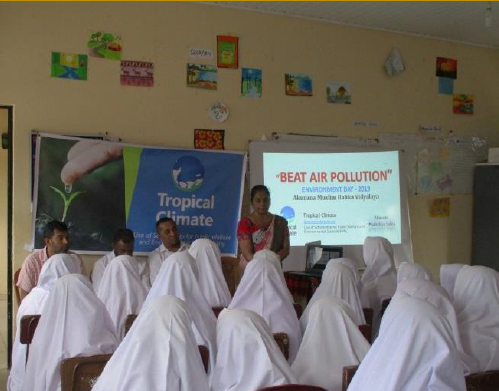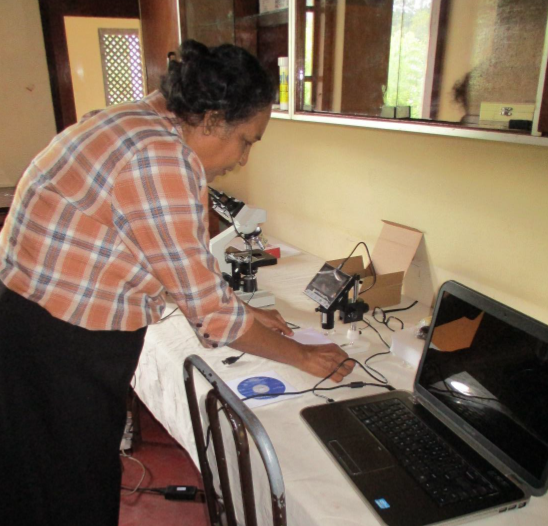|
Cycle 7 (2018 Deadline)
Developing dengue risk predictions from environmental, entomological, and societal information to aid public health management in Sri Lanka
PI: Pahalagedera Hewayalage Dona Kusumawathie (drkusumawathie@gmail.com), Tropical Climate Guarantee
U.S. Partner: Aravinda de Silva, University of North Carolina Chapel Hill
Dates: November 2018 - April 2022
Project Websites: https://tropicalclimateguarantee.org/dengueand htpps://disease.lk
Social Media: Facebook - https://www.facebook.com/diseaselk • Twitter - https://twitter.com/diseaselk • Instagram - https://www.instagram.com/diseaselk/
Project Overview
Dengue is a major vector-borne viral disease that has become a serious public health problem in Sri Lanka and elsewhere, but the lack of a vaccine against it means that control programs rely on management of environmental and human factors. Dengue is highly intermittent, has some seasonality, and is showing an exponential rise in the last few decades (Hopp & Foley, 2003). Dengue outbreaks are primarily associated with climatic variables such as rainfall, temperature, and relative humidity. Usually peak transmission occurs after the rains in the areas where the mosquito population is high and temperature and humidity levels are optimal. Nevertheless, there can be situations where transmission is enhanced during droughts, as water storage becomes more important. Though the risk of epidemics is contingent on a complex set of social, environmental, climatic, and epidemiological factors and their prediction is fraught with uncertainty, climate is a critical factor. As there is a 1-2 month lag between heavy rains and dengue transmission, targeted weather monitoring can give advance warning of dengue risks and trigger alerts to the authorities to launch cleanup programs of potential breeding sites.
 |  | | Project team members teaching at the Muslim Balika Vidyalaya event. | Dr. Kusumawathie preparing to observe mosquito eggs through the digital microscope (photos courtesy of Dr. Kusumawathie) |
To address the problem of dengue in Sri Lanka, this project involves entomological surveillance, weather and climate impact analysis, vulnerability analysis, and the development of monitoring systems for mosquito abundance and vulnerability. The scientific objectives are to (1) identify relationships between prevalence and transmissivity of the dengue vectors and weather using routinely collected data; (2) identify relationships between abundance of vectors, incidence of dengue, and weather in the country’s Central Region; and (3) develop dengue risk prediction methodology based on weather for high-risk centers. Through these efforts the PI and her team will develop an early warning system for dengue risk using weather, climate, entomological and epidemiological information for Sri Lanka, working in close collaboration with the Central Province Health Department and National Dengue Control officials. These government officials will be engaged in helping to develop the risk prediction methodology and formats for dissemination. The PI and her team will share their results and recommendations with public health officers and other interested stakeholders via the Internet and in-person workshops.
Final Summary of Project Activities
This project involved a large multidisciplinary team of 39 scientists (13 male and 26 female) working together to compile and analyze an archive of data on epidemiology, climate, entomology, and socioeconomic factors associated with the transmission of dengue in Sri Lanka. The work was particularly challenging in a setting where much of the data had previously been in paper format only, in different siloed organizations, and subject to strict access requirements. Dr. Kusumawathie and her team assembled dengue case data for research at different spatial (village, sub-district, district, provincial) levels and temporal (daily, weekly, monthly, quarterly, and annual) scales. To integrate climate factors, they compiled daily and monthly rainfall, temperature, and relative humidity data from available stations. The scientific objectives were to (1) identify relationships between prevalence and transmissivity of the dengue vectors and weather using routinely collected data; (2) identify relationships between abundance of vectors, incidence of dengue, and weather in the country’s Central Region; and (3) develop dengue risk prediction methodology based on weather for high-risk centers. Through these efforts the PI and her team have developed an early warning system for dengue risk using weather, climate, entomological and epidemiological information for Sri Lanka, working in close collaboration with the Central Province Health Department and National Dengue Control officials. These government officials were engaged in helping to develop the risk prediction methodology and formats for dissemination.
The PI and her team shared their results and recommendations with public health officers and other interested stakeholders via the Internet and in-person workshops, highlighting the emerging evidence of climatic influence on dengue, both spatially and temporally. Key project outputs included the following:
- A database of fine-scale climatic, hydrological, entomological, and dengue information
- Fine-scale climate analysis and high-resolution prediction techniques
- A climate monitoring system, including 13 weather stations from which the researchers can continue to draw data that they feed into weekly climate bulletins. For the location of Akurana, they have been communicating our data online through Twitter and Facebook accounts.
- Geographic Information Systems mapping for climatic, hydrological, dengue and societal data
- Curriculum and Course Development. Several courses for health sector and other sector personnel were developed and submitted to the Tertiary and Vocational Education Commission, including on topics related to climate change and data management.
In terms of broader impacts, Dr. Kusumawathie cites the strengthening of her team’s relationship with the National and Provincial Health Authority, as well as the establishment of new linkages with the U.S. Embassy and USAID. They have also built networks of local government, semi-government, and private tertiary education institutions in Sri Lanka and provided internships to students from the University of Peradeniya, University of Ruhuna, Open University Sri Lanka, Sri Lanka Institute of Advanced Technological Education, National Institute of Business Management, and International College of Business and Technology. Going forward now that the PEER funding has ended and the situation in Sri Lanka is stabilizing, the PI and her colleagues plan to continue implementing outreach and training programs for their stakeholders and students, collecting data from their weather station, and producing monthly dengue risk updates. They have made many in-person presentations to conferences and other events and plan to continue that practice, as well as publishing their work in journals. They will also continue maintaining their website www.disease.lk focusing on climate and disease and highlighting their approach based on the use of environmental, climate, and vulnerability information. Apart from dengue information, they have been populating the site with data on COVID-19 and other emerging infectious diseases.
Publications
A. Nijamdeen and L. Zubair. 2022. Sri Lanka. Pp. 75-93 in Glantz, M.H. (eds) El Niño Ready Nations and Disaster Risk Reduction. Disaster Studies and Management. Springer, Cham. https://doi.org/10.1007/978-3-030-86503-0
S.W.S. Sasna, K. Wikramasinghe, and L. Zubair. 2022. The effects of climate on dengue occurrence in Matale, Sri Lanka: Generalized Linear Models. Rajarata University Journal 7(2).
Selected Recent Abstracts Presented
AGU Fall Meeting in New Orleans (Virtual and Physical) - 2021
- Nijamdeen, K. Wickramasinghe, C. Kulasinghe, Z. Javad, Kusumawathie Pahalegedera, Towards a Dengue Early Warning System in Sri Lanka: Climatic influences on Dengue mosquito prevalence, Seasonal and Temporal Variability of Dengue Incidence around the Knuckles Mountain Range, American Geophysical conference 2021
- A. Nijamdeen, K. Wickramasinghe, G. Sathyamohan, L. Zubair, The Xpress-Pearl Marine Disaster off Sri Lanka in May 2021: Atmospheric Transport of Pollution from the Fire and Explosion - Auditing Materials on board, Modeling Air Pollution Plumes and Air Pollution measurements in Sri Lanka, American Geophysical conference 2021
- Z. Iwais, U. Adithya, A. Munas, N. Alahakoon, K. Wickramasinghe, L. Zubair, Is an IoT based Operational Air Quality Monitoring System Feasible for Sri Lanka?, American Geophysical conference 2021
- N. Alahakoon, U. Adithya, A. Munas, L. Zubair, Lessons from Developing and Sustaining Climate Services in Sri Lanka and Maldives for 15 years: Provision of Weekly/Monthly Bulletins, Advisory Services and Forensic Analysis, American Geophysical conference 2021
SLAAS Annual Technical Session 2021
- A.C.W.Kulasinghe, D.H.K.Wickramasinghe, A. Nijamdeen, P.H.D.Kusumawathie, L. Zubair , Dengue epidemic identification and its seasonal and spatial variability in the sub-districts of Matale district, Sri Lanka Association for the Advancement of Science (SLAAS), Technical Session 2021
- D.H.K.Wickramasinghe, A. Nijamdeen, A.C.W.Kulasinghe, P.H.D.Kusumawathie, L. Zubair, Seasonal and Spatial Variability of Prevalence of Dengue and its Transmitting Vectors in the Matale District, Sri Lanka Association for the Advancement of Science (SLAAS), Technical Session 2021
- D.H.K.Wickramasinghe, A. Nijamdeen, L. Zubair, Assessing the impact of the X-Press Pearl Ship Fire on air pollution in Western Sri Lanka, Sri Lanka Association for the Advancement of Science (SLAAS), Technical Session 2021
- S. Gobishankar, D.H.K.Wickramasinghe, A. Nijamdeen, L. Zubair, Simulating the dispersion of pollution in the atmospheric from the Fire about the X-Press Pearl Ship, Sri Lanka Association for the Advancement of Science (SLAAS), Technical Session 2021
- Z. Iwais, U. Adithya, A. Munas, N. Alahakoon, K. Wickramasinghe, L. Zubair, Is an IoT based operational air quality monitoring system feasible for Sri Lanka?, Sri Lanka Association for the Advancement of Science (SLAAS), Technical Session 2021
- S. Gammanpila, A. Nijamdeen, L. Zubair, Contamination of Groundwater and Soil and Risk of Further Transmission due to COVID19 Infected and Other Burials: Does Sri Lanka’s environment pose a unique risk?, Sri Lanka Association for the Advancement of Science (SLAAS), Technical Session 2021
Back to PEER Cycle 7 Grant Recipients
|
|
|
|





